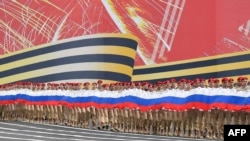The holiday on Tuesday marks the 78th anniversary of Germany's capitulation in World War II after a relentless Red Army offensive pushed German forces from Stalingrad, deep inside Russia, all the way to Berlin, about 2,200 kilometers.
Moscow’s famed Red Square military parade will go ahead following Russia's claim of an attempted Ukrainian drone attack on the Kremlin, whose spires loom next to the parade venue.
However, many regions have canceled their May 9 observances because of concerns the events could be targets for Ukrainian attacks.
Russia’s failure to make gains in Ukraine spoils the image of its army’s indomitability.
After seizing sizable parts of the neighboring country in the opening weeks of the invasion, the Russian campaign saw an abandoned attempt to enter Kyiv, retreats in northern and southern Ukraine, and an inability to take Bakhmut, a small city of questionable value, despite months of exceptionally gruesome fighting.
President Vladimir Putin, in his speech during the parade, is sure to praise the Red Army’s determination to wipe out Nazism and to repeat his assertion that Russia is taking the moral high ground by fighting an alleged Nazi regime, in Ukraine, a country with a Jewish president.
Amid the heightened security worries, authorities also canceled one of Victory Day's most notable observances, the “Immortal Regiment” processions in which throngs of citizens take to the streets holding portraits of relatives who died or served in World War II.
The processions carry an air of genuine emotion, in sharp contrast to the obedient stone-faced soldiers who march across Red Square during the tightly regimented military parades that change little from year to year.
Although the processions are moving and impressively large, authorities “thought that the risks were becoming prohibitive,” said Russian analyst Dmitry Oreshkin, now at the Free University in Riga, Latvia. “If some kind of drones fly there, penetrate through the impenetrable border ... then why can’t they drop something on this column?”
